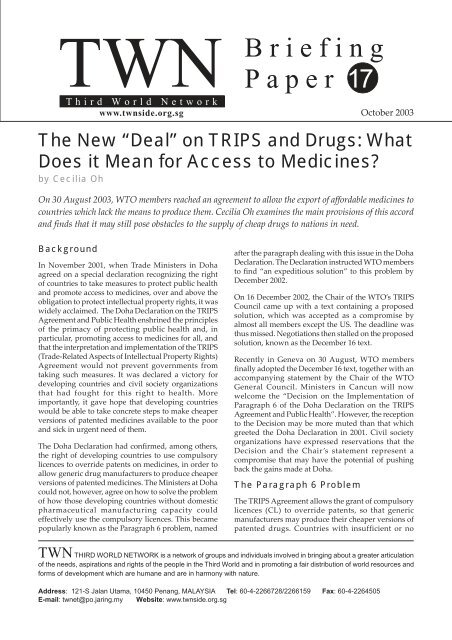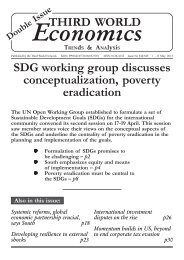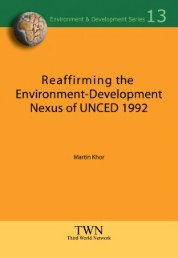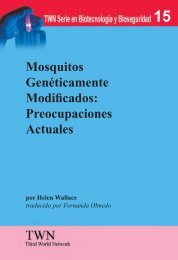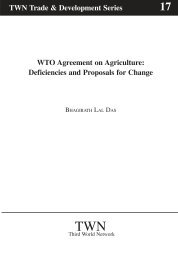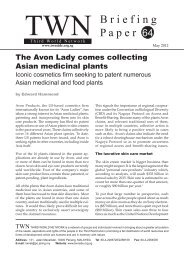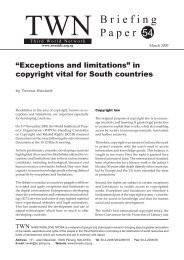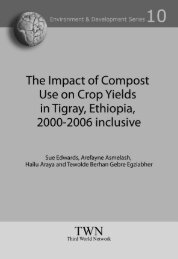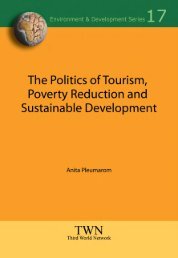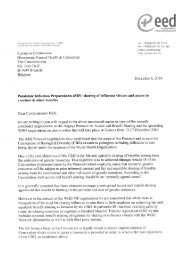The New âDealâ on TRIPS and Drugs - Third World Network
The New âDealâ on TRIPS and Drugs - Third World Network
The New âDealâ on TRIPS and Drugs - Third World Network
You also want an ePaper? Increase the reach of your titles
YUMPU automatically turns print PDFs into web optimized ePapers that Google loves.
TWNT h i r d W o r l d N e t w o r kB r i e f i n gP a p e r 17www.twnside.org.sg October 2003<str<strong>on</strong>g>The</str<strong>on</strong>g> <str<strong>on</strong>g>New</str<strong>on</strong>g> “Deal” <strong>on</strong> <strong>TRIPS</strong> <strong>and</strong> <strong>Drugs</strong>: WhatDoes it Mean for Access to Medicines?by Cecilia OhOn 30 August 2003, WTO members reached an agreement to allow the export of affordable medicines tocountries which lack the means to produce them. Cecilia Oh examines the main provisi<strong>on</strong>s of this accord<strong>and</strong> finds that it may still pose obstacles to the supply of cheap drugs to nati<strong>on</strong>s in need.BackgroundIn November 2001, when Trade Ministers in Dohaagreed <strong>on</strong> a special declarati<strong>on</strong> recognizing the rightof countries to take measures to protect public health<strong>and</strong> promote access to medicines, over <strong>and</strong> above theobligati<strong>on</strong> to protect intellectual property rights, it waswidely acclaimed. <str<strong>on</strong>g>The</str<strong>on</strong>g> Doha Declarati<strong>on</strong> <strong>on</strong> the <strong>TRIPS</strong>Agreement <strong>and</strong> Public Health enshrined the principlesof the primacy of protecting public health <strong>and</strong>, inparticular, promoting access to medicines for all, <strong>and</strong>that the interpretati<strong>on</strong> <strong>and</strong> implementati<strong>on</strong> of the <strong>TRIPS</strong>(Trade-Related Aspects of Intellectual Property Rights)Agreement would not prevent governments fromtaking such measures. It was declared a victory fordeveloping countries <strong>and</strong> civil society organizati<strong>on</strong>sthat had fought for this right to health. Moreimportantly, it gave hope that developing countrieswould be able to take c<strong>on</strong>crete steps to make cheaperversi<strong>on</strong>s of patented medicines available to the poor<strong>and</strong> sick in urgent need of them.<str<strong>on</strong>g>The</str<strong>on</strong>g> Doha Declarati<strong>on</strong> had c<strong>on</strong>firmed, am<strong>on</strong>g others,the right of developing countries to use compulsorylicences to override patents <strong>on</strong> medicines, in order toallow generic drug manufacturers to produce cheaperversi<strong>on</strong>s of patented medicines. <str<strong>on</strong>g>The</str<strong>on</strong>g> Ministers at Dohacould not, however, agree <strong>on</strong> how to solve the problemof how those developing countries without domesticpharmaceutical manufacturing capacity couldeffectively use the compulsory licences. This becamepopularly known as the Paragraph 6 problem, namedafter the paragraph dealing with this issue in the DohaDeclarati<strong>on</strong>. <str<strong>on</strong>g>The</str<strong>on</strong>g> Declarati<strong>on</strong> instructed WTO membersto find “an expeditious soluti<strong>on</strong>” to this problem byDecember 2002.On 16 December 2002, the Chair of the WTO’s <strong>TRIPS</strong>Council came up with a text c<strong>on</strong>taining a proposedsoluti<strong>on</strong>, which was accepted as a compromise byalmost all members except the US. <str<strong>on</strong>g>The</str<strong>on</strong>g> deadline wasthus missed. Negotiati<strong>on</strong>s then stalled <strong>on</strong> the proposedsoluti<strong>on</strong>, known as the December 16 text.Recently in Geneva <strong>on</strong> 30 August, WTO membersfinally adopted the December 16 text, together with anaccompanying statement by the Chair of the WTOGeneral Council. Ministers in Cancun will nowwelcome the “Decisi<strong>on</strong> <strong>on</strong> the Implementati<strong>on</strong> ofParagraph 6 of the Doha Declarati<strong>on</strong> <strong>on</strong> the <strong>TRIPS</strong>Agreement <strong>and</strong> Public Health”. However, the recepti<strong>on</strong>to the Decisi<strong>on</strong> may be more muted than that whichgreeted the Doha Declarati<strong>on</strong> in 2001. Civil societyorganizati<strong>on</strong>s have expressed reservati<strong>on</strong>s that theDecisi<strong>on</strong> <strong>and</strong> the Chair’s statement represent acompromise that may have the potential of pushingback the gains made at Doha.<str<strong>on</strong>g>The</str<strong>on</strong>g> Paragraph 6 Problem<str<strong>on</strong>g>The</str<strong>on</strong>g> <strong>TRIPS</strong> Agreement allows the grant of compulsorylicences (CL) to override patents, so that genericmanufacturers may produce their cheaper versi<strong>on</strong>s ofpatented drugs. Countries with insufficient or noTWN THIRD WORLD NETWORK is a network of groups <strong>and</strong> individuals involved in bringing about a greater articulati<strong>on</strong>of the needs, aspirati<strong>on</strong>s <strong>and</strong> rights of the people in the <strong>Third</strong> <strong>World</strong> <strong>and</strong> in promoting a fair distributi<strong>on</strong> of world resources <strong>and</strong>forms of development which are humane <strong>and</strong> are in harm<strong>on</strong>y with nature.Address: 121-S Jalan Utama, 10450 Penang, MALAYSIA Tel: 60-4-2266728/2266159 Fax: 60-4-2264505E-mail: twnet@po.jaring.my Website: www.twnside.org.sg
domestic manufacturing capacity in pharmaceuticalsare faced with a problem because there are no genericmanufacturers to produce the drugs domestically. Anopti<strong>on</strong> for these countries is to grant a CL for the importof such drugs.However, the supply of drugs for these countries toimport may be limited <strong>and</strong> insufficient because ofc<strong>on</strong>straints placed by the <strong>TRIPS</strong> Agreement <strong>on</strong> thecountries that have the capacity to produce <strong>and</strong> exportthe generic versi<strong>on</strong>s. <str<strong>on</strong>g>The</str<strong>on</strong>g> reas<strong>on</strong> is that the <strong>TRIPS</strong>Agreement (Article 31(f)) requires that the producti<strong>on</strong>of generic drugs under a CL be “predominantly for thesupply of the domestic market”. This restricti<strong>on</strong> wouldmean that export of drugs produced under acompulsory licence is possible <strong>on</strong>ly if the“predominant” porti<strong>on</strong> of the producti<strong>on</strong> output hasbeen supplied to the domestic market. This raises thec<strong>on</strong>cern that the n<strong>on</strong>-predominant porti<strong>on</strong> may not besufficient for the needs of the importing country orcountries.<str<strong>on</strong>g>The</str<strong>on</strong>g> Agreed “Soluti<strong>on</strong>”<str<strong>on</strong>g>The</str<strong>on</strong>g> “soluti<strong>on</strong>” is essentially a waiver of the Article 31(f)limitati<strong>on</strong> <strong>on</strong> exports, which lifts the requirement ofArticle 31(f) that pharmaceutical products producedunder a CL shall be “predominantly for the supply ofthe domestic market”. With this waiver in force, itmeans that a predominant porti<strong>on</strong> or even the totalamount of producti<strong>on</strong> under a CL could be exportedto a country that wishes to import. WTO members alsoagreed to an accompanying statement by the GeneralCouncil Chair which spells out a number of “key sharedunderst<strong>and</strong>ings” of how the Decisi<strong>on</strong> would beinterpreted <strong>and</strong> implemented. <str<strong>on</strong>g>The</str<strong>on</strong>g> Chair’s statementis widely known to be the US’ attempt to seek “comfortlanguage” that would assuage c<strong>on</strong>cerns of its powerfulpharmaceutical lobby that the Decisi<strong>on</strong> would allowgeneric manufacturers to gain a str<strong>on</strong>ger foothold inthe profitable pharmaceutical market. <str<strong>on</strong>g>The</str<strong>on</strong>g> US had, inmid-August 2003, come up with its proposal for aChair’s statement that would enable them to agree tothe December 16 text — eight m<strong>on</strong>ths after the USstalled negotiati<strong>on</strong>s by withholding c<strong>on</strong>sensus after(almost) all WTO members had agreed to it inDecember 2002.After hurried c<strong>on</strong>sultati<strong>on</strong>s in the few weeks before theend of August, members agreed to the final versi<strong>on</strong> ofthe Chair’s statement. <str<strong>on</strong>g>The</str<strong>on</strong>g> statement c<strong>on</strong>firms thecomm<strong>on</strong> underst<strong>and</strong>ing of members that the Decisi<strong>on</strong>should be used in good faith to protect public healthpurposes, <strong>and</strong> not for industrial or commercial policyobjectives. It also emphasizes the need to preventdiversi<strong>on</strong> of medicines from the markets for which theyare intended, elaborating <strong>on</strong> the trade-diversi<strong>on</strong>preventi<strong>on</strong>measures that are required to be taken bycountries using the Decisi<strong>on</strong>.Will it Work? And How?<str<strong>on</strong>g>The</str<strong>on</strong>g> objective of the Decisi<strong>on</strong> is to allow for countrieswishing to import generic medicines to do so from aforeign generic producer. Where a patent is in force inthe importing country <strong>on</strong> the drug in questi<strong>on</strong>, theimporting country government will have to issue a CLto enable the import of the generic versi<strong>on</strong> of thepatented drug. In the exporting country, the patentstatus of the drug is also relevant: if a patent is in force,then the generic manufacturer would have to obtain aCL to produce the drug <strong>and</strong> export it.In countries where there is no patent in force — forexample, least-developed country (LDC) membersneed not allow for drug patents until 2016 — theimporting country need not issue a CL. Similarly, in anexporting country where there is no patent in force,the producti<strong>on</strong> <strong>and</strong> export can take place without issueof a CL. However, there are very few countries in thissituati<strong>on</strong>, India being a notable excepti<strong>on</strong> until 2005,when all countries will have to provide full patentprotecti<strong>on</strong>. This is the reas<strong>on</strong> why it was of crucialimportance that a soluti<strong>on</strong> to the Paragraph 6 problemwas found quickly.<str<strong>on</strong>g>The</str<strong>on</strong>g>refore, in many cases, two CLs will have to beissued. Under the <strong>TRIPS</strong> Agreement <strong>and</strong> c<strong>on</strong>firmed bythe Doha Declarati<strong>on</strong>, WTO members have the rightto determine the grounds for the grant of compulsorylicences. <str<strong>on</strong>g>The</str<strong>on</strong>g> st<strong>and</strong>ard procedural c<strong>on</strong>diti<strong>on</strong>s for thegrant of CL are set out in the <strong>TRIPS</strong> Agreement (Article31), which includes the c<strong>on</strong>diti<strong>on</strong>s that an applicati<strong>on</strong>for a CL should be preceded by a failed attempt toobtain a voluntary licence from the patent holder <strong>and</strong>the payment of compensati<strong>on</strong> to the patent holder. <str<strong>on</strong>g>The</str<strong>on</strong>g>Decisi<strong>on</strong> now modifies some of these requirements <strong>and</strong>sets out another set of procedures to be complied with,when the waiver of Article 31(f) is required to allowfor generic medicines made in <strong>on</strong>e country to beexported to another.A Compulsory Licence to ImportSo, when a developing country wishes to importgeneric medicines (<strong>and</strong> the said medicine is underpatent protecti<strong>on</strong> in the country), the importing countrywill have to do the following:(a) Notify the WTO of its intenti<strong>on</strong> to use the soluti<strong>on</strong>as an importer (LDCs are not required to notify); thenames <strong>and</strong> expected quantities of the product(s)needed; its c<strong>on</strong>firmati<strong>on</strong> that it has established that ithas insufficient or no manufacturing capacity (see (b)below); <strong>and</strong> its grant or intenti<strong>on</strong> to grant a CL.(b) Establish insufficient or no manufacturing capacity.LDCs are automatically eligible, while otherdeveloping countries have to qualify to use the soluti<strong>on</strong>.Developing countries have to establish either that: i)they have no manufacturing capacity in thepharmaceutical sector; or that ii) the capacity iscurrently insufficient for the purpose of meeting itsneeds. <str<strong>on</strong>g>The</str<strong>on</strong>g> Decisi<strong>on</strong> suggests that countries make thisdeterminati<strong>on</strong> themselves, i.e., it is a self-determinati<strong>on</strong>test. Developed countries have “opted out” of usingthe soluti<strong>on</strong> <strong>and</strong> 11 high-income developing countries
countries in their use of the Decisi<strong>on</strong>.<str<strong>on</strong>g>The</str<strong>on</strong>g> Chair’s statement would seem to be the last (<strong>and</strong>successful) in the series of attempts to restrict the use<strong>and</strong> effectiveness of the soluti<strong>on</strong>. In the early stages ofnegotiati<strong>on</strong>s <strong>on</strong> the Paragraph 6 problem, the US hadsought to put limits <strong>on</strong> the scope of diseases to becovered under any soluti<strong>on</strong>. When this was rejected,an attempt was made to restrict the circumstances inwhich the soluti<strong>on</strong> may be used.Developing countries also rejected the proposal for aChairman’s underst<strong>and</strong>ing that the soluti<strong>on</strong> be used<strong>on</strong>ly in circumstances of nati<strong>on</strong>al emergency or extremeurgency. <str<strong>on</strong>g>The</str<strong>on</strong>g>n, there was the attempt to pressure somecountries against using the soluti<strong>on</strong>, questi<strong>on</strong>ing theireligibility. It had been reported that a number ofdeveloping countries have been informed by the USthat they are c<strong>on</strong>sidered ineligible, even though theDecember 16 text had clearly made eligibility a matterof nati<strong>on</strong>al decisi<strong>on</strong>.Put it to the TestIt now remains to be seen whether or not developingcountries will make use of the soluti<strong>on</strong>, <strong>and</strong> if it will infact make access to affordable medicines a reality. <str<strong>on</strong>g>The</str<strong>on</strong>g>Decisi<strong>on</strong> will have to be tested as to whether countrieswill try to use it <strong>and</strong> whether it can be used successfully.This means that developing-country governments willhave to issue the necessary compulsory licences for theimport of generic medicines. Generic manufacturers inother countries will have to resp<strong>on</strong>d to this call bymaking applicati<strong>on</strong>s for compulsory licences toproduce <strong>and</strong> export. In some cases where productpatent protecti<strong>on</strong> is not yet in force, such as in India,generic manufacturers may produce <strong>and</strong> exportwithout the need for compulsory licences until 2005.In the cases where compulsory licences are required,governments will have to issue compulsory licencesfor producti<strong>on</strong> <strong>and</strong> export by their genericmanufacturers to produce <strong>and</strong> export. Developedcountrygovernments can prove their good faith bygranting compulsory licences for export whenrequested by their generic manufacturers.<str<strong>on</strong>g>The</str<strong>on</strong>g> Decisi<strong>on</strong> also c<strong>on</strong>firms that it does not prejudicethe existing rights <strong>and</strong> flexibilities available under the<strong>TRIPS</strong> Agreement, including the extent to whichpharmaceutical products produced under compulsorylicence can be exported under the present provisi<strong>on</strong>sof Art. 31(f). <str<strong>on</strong>g>The</str<strong>on</strong>g> <strong>TRIPS</strong> Agreement currently allowsexport of the n<strong>on</strong>-predominant porti<strong>on</strong> of producti<strong>on</strong>under CL (theoretically, anything up to 49% ofproducti<strong>on</strong>) without these additi<strong>on</strong>al c<strong>on</strong>diti<strong>on</strong>s.Where a CL for remedying anti-competitive practicesis granted, the total producti<strong>on</strong> output (i.e., 100%) canbe exported, without any of the additi<strong>on</strong>al c<strong>on</strong>diti<strong>on</strong>sspecified in the Decisi<strong>on</strong>. <str<strong>on</strong>g>The</str<strong>on</strong>g>refore, it would appearthat where a member seeks to export under thesecircumstances, it need not meet any of the terms <strong>and</strong>c<strong>on</strong>diti<strong>on</strong>s specified under the Decisi<strong>on</strong>. WTOmembers should therefore explore the means of usingthese rights <strong>and</strong> flexibilities as an alternative or inc<strong>on</strong>juncti<strong>on</strong> with the Decisi<strong>on</strong>.<str<strong>on</strong>g>The</str<strong>on</strong>g> Decisi<strong>on</strong> represents <strong>on</strong>ly <strong>on</strong>e aspect of the broadframework that the Doha Declarati<strong>on</strong> provides tosafeguard against unaffordable prices for much-neededmedicines. <str<strong>on</strong>g>The</str<strong>on</strong>g> Doha Declarati<strong>on</strong> affirms the right ofWTO members to employ other measures to facilitatethe protecti<strong>on</strong> of public health <strong>and</strong> promote access tomedicines. <str<strong>on</strong>g>The</str<strong>on</strong>g> implementati<strong>on</strong> of these measures indeveloping countries is far from complete. <str<strong>on</strong>g>The</str<strong>on</strong>g>refore,countries should take urgent measures to adopt <strong>and</strong>adapt their nati<strong>on</strong>al patent laws, so as to make full useof the flexibilities in the <strong>TRIPS</strong> Agreement, as affirmedby the Doha Declarati<strong>on</strong>. This includes not <strong>on</strong>ly theadopti<strong>on</strong> of rules <strong>and</strong> guidelines to facilitate the grantof compulsory licences <strong>on</strong> public health grounds, butalso to provide for the appropriate instituti<strong>on</strong>al <strong>and</strong>administrative framework that is necessary for theeffective implementati<strong>on</strong> of public-health-sensitivepatent laws. <str<strong>on</strong>g>The</str<strong>on</strong>g>re are also other <strong>TRIPS</strong>-c<strong>on</strong>sistentmeasures, including the use of parallel imports,government-use provisi<strong>on</strong>s <strong>and</strong> excepti<strong>on</strong>s to patentrights, that may be used to mitigate the effects ofpharmaceutical patents, <strong>and</strong> the use of these measuresshould be properly explored by developing countriesas alternatives.<str<strong>on</strong>g>The</str<strong>on</strong>g> Doha Declarati<strong>on</strong> also granted the right to notprovide for pharmaceutical patents to LDC membersuntil 2016. <str<strong>on</strong>g>The</str<strong>on</strong>g>refore, these countries should becauti<strong>on</strong>ed against enforcing or providing for patents<strong>on</strong> pharmaceutical products until 2016 at the earliest.LDCs should use this flexibility to enable them tostructure their patent laws <strong>and</strong> data protecti<strong>on</strong> rulesso as to better protect public health <strong>and</strong> promote accessto affordable medicines.<str<strong>on</strong>g>The</str<strong>on</strong>g> negotiati<strong>on</strong>s leading up to the Doha Declarati<strong>on</strong><strong>and</strong> the recent Decisi<strong>on</strong> have highlighted the effects ofpatents <strong>on</strong> the prices of <strong>and</strong> access to medicines. <str<strong>on</strong>g>The</str<strong>on</strong>g>implicati<strong>on</strong>s of the <strong>TRIPS</strong> Agreement <strong>on</strong> public health<strong>and</strong> access to medicines are now better understood.Internati<strong>on</strong>al public opini<strong>on</strong> will have to be the judgeof whether the declarati<strong>on</strong>s <strong>and</strong> decisi<strong>on</strong>s in the WTOhave had a real impact <strong>on</strong> improving people’s accessto affordable medicines. If it is judged that these havenot been effective, it may be that pressures will thenbegin for more far-reaching changes.(This paper first appeared as a Briefing Paper of the <strong>Third</strong><strong>World</strong> <strong>Network</strong> for the 5th Ministerial C<strong>on</strong>ference of the<strong>World</strong> Trade Organisati<strong>on</strong> (WTO) held in Cancun inSeptember 2003.)CECILIA OH is a representative <strong>and</strong> Legal Advisor ofthe <strong>Third</strong> <strong>World</strong> <strong>Network</strong> based in Geneva.


